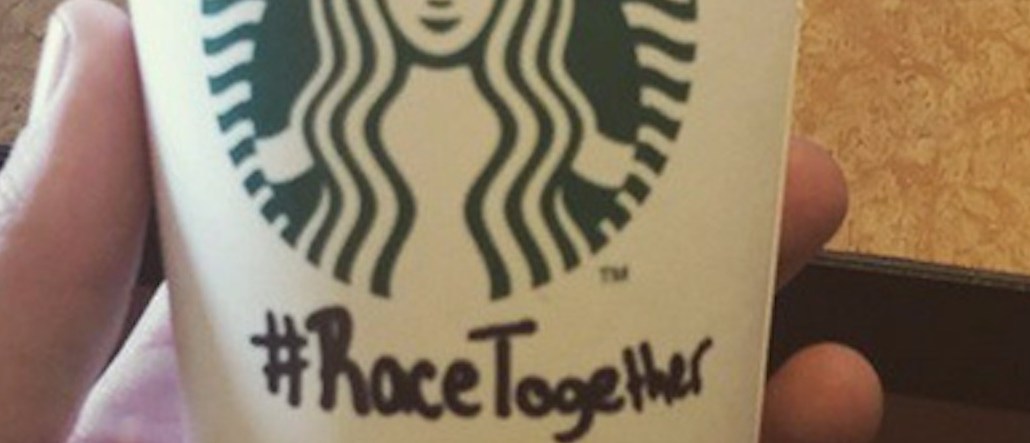Save 50% on a 3-month Digiday+ membership. Ends Dec 5.

Would you like some race-talk with your Venti caramel macchiato? How about a breakfast sandwich while we chat about the disproportionate number of incarcerated African-Americans in the U.S.? On Monday, Starbucks announced, in a full-page ad in USA Today, that it will be launching a new campaign in which its baristas will begin conversations about race with customers waiting on line. Because there’s nothing anyone likes more than at little racial tension before their morning coffee.
For Starbucks CEO Howard Schultz, who has always involved his company in political hot potatoes from gay marriage to gun control, this is a way to facilitate an honest discussion about race in America, an “emotional issue” that’s “vitally important to the country.” Schultz made the announcement in a video addressing 200,000 Starbucks employees — 40 percent of whom are racial minorities. A supplement in USA Today set go out March 20 will feature “conversation starters” that will ask questions like, “In the past year, I have been to the home of someone of a different race [BLANK] times.”
While perhaps well intentioned, the announcement struck many online as slightly tone-deaf. On Twitter, many questioned why Starbucks — a major brand — needs to insert itself into a conversation as fraught as race relations in America. Others said that writing things on cups was definitely not the way to solve the problem.
yesterday: talk about Love at McDonalds today: talk about race at starbucks tmrw: psychoanalysis from guy who makes blizzards at dairy queen — ಠ_ಠ (@MikeIsaac) March 17, 2015
Matthew Quint, director of the Center on Global Brand Leadership at Columbia Business School said that, perhaps counterintuitively for a publicly traded company, the move isn’t off brand: Starbucks has always struck a socially progressive note. But, navigating the minefield of race relations in this country is a uniquely thorny challenge. “It’s not generating the social discussion they hoped for. And it just doesn’t seem like a well-brewed idea,” said Quint.
The idea, according to Starbucks, came from an internal meeting with employees in which they discussed race. “Translating that to more than 200,000 employees and bringing in consumers is not easy,” said Quint. “My expectation is it’ll fizzle out or it’ll pivot and become more concrete.”
Of course, there is one upside already: Starbucks has gotten plenty of free attention for the stunt. “Starbucks race” peaked on Twitter Monday, with more than 7,000 tweets about the issue, according to Topsy.
It is nothing new for a brand to dip its toe into political waters. Earlier this year, McDonald’s tried to get people to show love to people they ordinarily would not with an activation that let customers get their food for free in exchange for actions like calling their mom, or telling someone they loved them. Last summer, Chipotle printed essays and poems by well-known writers like Jonathan Safran Foer on its cups and bags, in an attempt to drive conversation about thoughtfulness and the importance of reading. It did not achieve the desired effect: A New Yorker Shouts and Murmurs post put it perfectly when it wrote a would-be letter from a Chipotle editor to a contributor:
“The collision of your loss of innocence with the ennui of the older lover beside you is surprising and completely consistent with Chipotle’s soft-taco branding.”
Ad position: web_incontent_pos1
Still, a growing swathe of millennial consumers do want the products they buy and the company that makes them to be socially responsible. But getting too political can backfire: A survey by the Global Strategy Group last year found that corporations that were seen as partisan — on either side — were less favorably viewed.
The new @Starbucks experience. pic.twitter.com/c9MOtFXjj4 — Ben Howe (@BenHowe) March 17, 2015
Customer: I’ll have a venti light roast… Race conscious Starbucks barista: Don’t you mean (removes sunglasses) Martin Luther King size?
— Erin Gloria Ryan (@morninggloria) March 17, 2015
actually i have nearly all of my discussions about race at blue bottle thank you
Ad rendering preventing in staging
Ad position: web_incontent_pos2
— Choire (@Choire) March 17, 2015
I am 100% interested in engaging with Starbucks employees in a conversation about race. Let's start with anyone _but_ the baristas. VPs! HR!
— Anil Dash (@anildash) March 17, 2015
More in Marketing

Ulta, Best Buy and Adidas dominate AI holiday shopping mentions
The brands that are seeing the biggest boost from this shift in consumer behavior are some of the biggest retailers.

U.K. retailer Boots leads brand efforts to invest in ad creative’s data layer
For media dollars to make an impact, brands need ad creative that actually hits. More CMOs are investing in pre- and post-flight measurement.
Ad position: web_bfu
